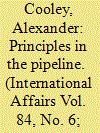| Srl | Item |
| 1 |
ID:
025283


|
|
|
|
|
| Publication |
Boulder, Westview Press, 1990.
|
| Description |
vii, 310p.
|
| Standard Number |
0813310148
|
|
|
|
|
|
|
|
|
|
|
|
Copies: C:1/I:0,R:0,Q:0
Circulation
| Accession# | Call# | Current Location | Status | Policy | Location |
| 033288 | 323.095/WEL 033288 | Main | On Shelf | General | |
|
|
|
|
| 2 |
ID:
047461


|
|
|
|
|
| Publication |
London, Routledge, 2000.
|
| Description |
ix, 240p.
|
| Standard Number |
0415191734
|
|
|
|
|
|
|
|
|
|
|
|
Copies: C:1/I:0,R:0,Q:0
Circulation
| Accession# | Call# | Current Location | Status | Policy | Location |
| 043246 | 323.34/HIL 043246 | Main | On Shelf | General | |
|
|
|
|
| 3 |
ID:
083995


|
|
|
|
|
| Publication |
2008.
|
| Summary/Abstract |
After a decade of relative neglect post-Soviet Central Asia has become a foreign policy priority for the transatlantic community. Both the United States and Europe have engaged with the region in recent years in pursuit of new strategic interests, including maintaining military basing access in support of coalition operations in Afghanistan and securing the export of Central Asian oil and gas to the West. Despite this period of renewed engagement, however, the quality of democratic governance within the region remains poor, especially in comparison with other post-communist regions that successfully completed their political transitions. In fact, the United States and the European Union have often tempered promoting their Central Asian democratization agendas in order to maintain access to these strategically important fixed assets. The transatlantic struggle to balance the pursuit of strategic interests and democratic values has been rendered more difficult by Russia's recent resurgence as a regional power. Backed by the Central Asian governments, Moscow has challenged the purpose and influence of western-based international and non-governmental organizations in the region, thereby further diminishing the transatlantic community's capacity to promote sustained democratic reforms.
|
|
|
|
|
|
|
|
|
|
|
|
|
|
|
|